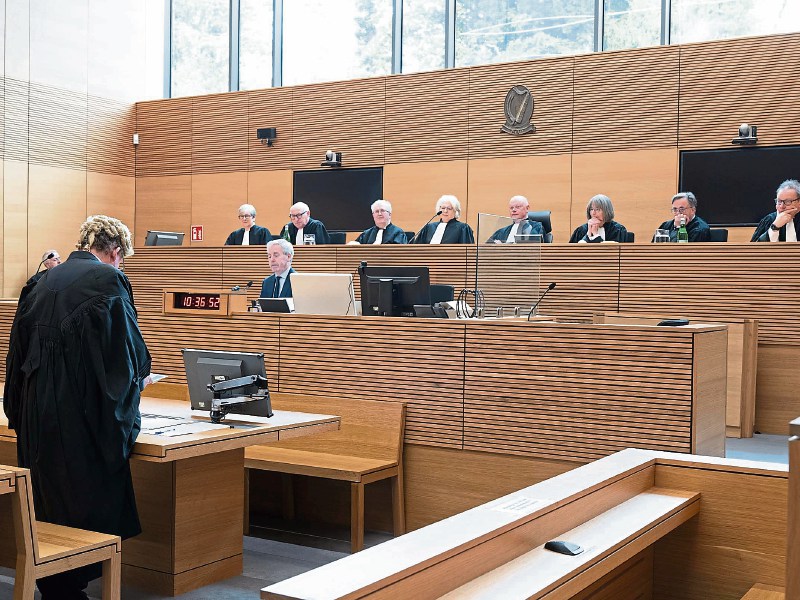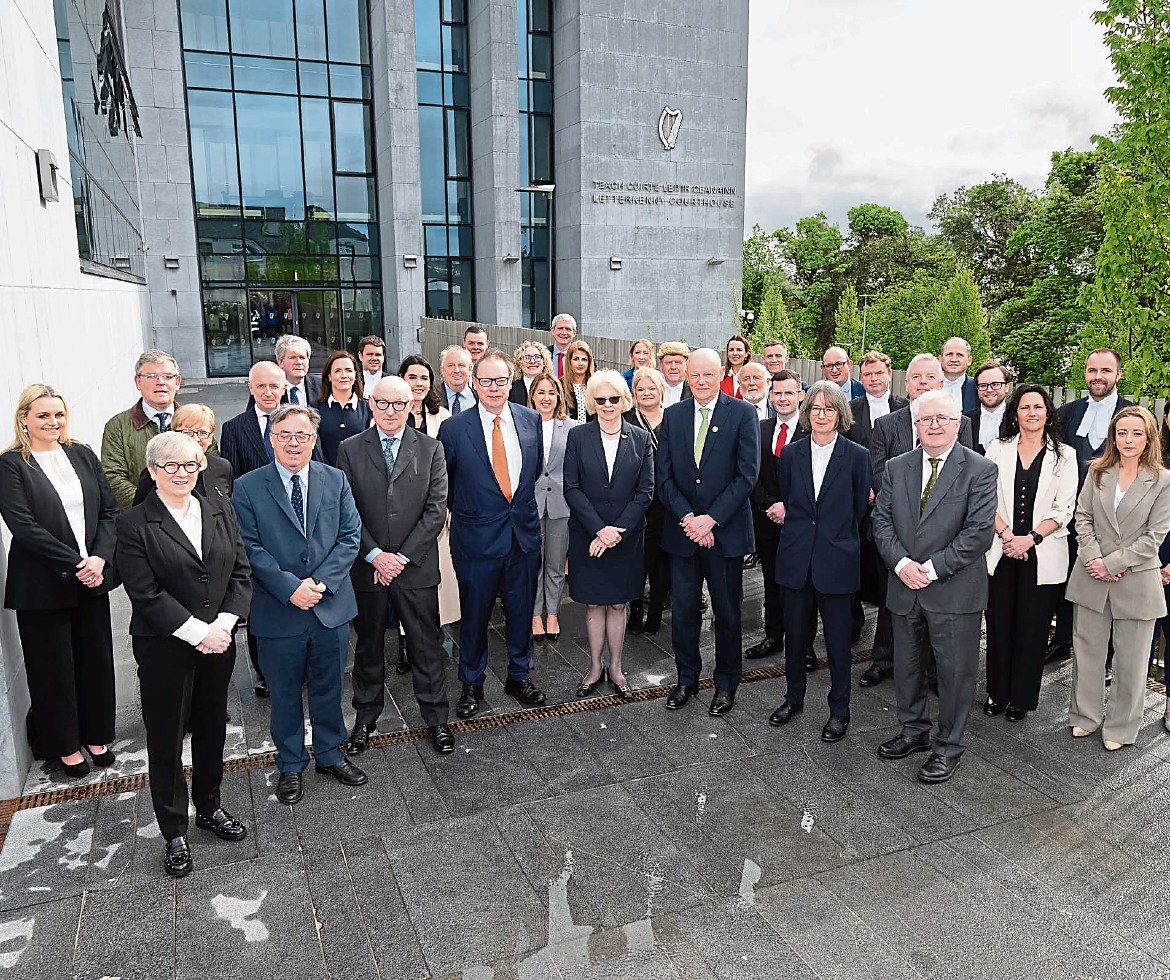by Paddy Walsh
HISTORY donned a legal gown this week to bring the Supreme Court to Donegal for the first time since it was established over a hundred years ago.
Five Judges, including the Chief Justice, Donal O’Donnell, presided over the case of Imran v the Minister for Justice, at Letterkenny Courthouse on Monday – marking a unique departure in lawful terms.
In an address prior to the hearing of the case, Mr Justice O’Donnell described it as a great personal pleasure to be back in County Donegal, the historic land of the O’Donnells, and to be present at the first sitting of the Supreme Court not only in Donegal but also in the historic province of Ulster.
“For the first 90 years, the Supreme Court sat exclusively in Dublin – all cases that came to the Supreme Court came from all over Ireland eventually. The country came to the Supreme Court rather than the Supreme Court going to the country.”
The creation of the Court of Appeal in 2013 created, he said, a new jurisdiction for the Supreme Court.
“It was now much less likely that cases from Donegal would come to the Supreme Court. It is much more likely now that decisions of the Supreme Court affect everyone, and therefore it was thought that it was important for the Supreme Court to sit more outside of Dublin,” said the Chief Justice.
Consequently the court has sat in Cork, Limerick, Galway and Waterford before the practice was interrupted by the Covid-19 pandemic in 2020.
And now in Donegal they were holding good on the promise of the then Chief Justice, Frank Clarke, at the opening of the new courthouse in Letterkenny in 2018.
The current Chief Justice reflected on the history of the Supreme Court that had sat for the first time in June 1924. He quoted the first Chief Justice, Hugh Kennedy, whose father hailed from Kilclooney, as saying at the time: “This is surely a precious moment – the moment when the silence of the Gael in the courts of law is broken. The moment when Irish courts are thrown open to administer justice according to laws made in Ireland by free Irish citizens.”
Mr Justice O’Donnell said that the administration of justice in public under the Constitution meant that any citizen of Ireland could come in and see the administration of justice in any court in Ireland, can see the argument of counsel, the evidence of witnesses, and hear and read the decisions, or in the case of the Supreme Court the reasons for the decision.
“This is something that is both precious and valuable, but also fragile. The purpose in many ways, of the court sitting outside Dublin is not just giving people an opportunity to see the Supreme Court, but it is a demonstration of the fact that the protection of the rule of law and the performance of the rule of law and the performance of justice is a job for every day.”
CONSEQUENTIAL CASES
Representing the Donegal Bar Association and the Inishowen Bar Association, Damian Crawford, B.L. said the county had an extensive legal history with a number of consequential cases over the years.
He recalled a case taken by the East Donegal Cooperative Livestock Association in July 1970 against the Attorney General and a case involving Mary Lynch and Maire Burke from Falcarragh in January 1990 who “got into a row” about the operation of joint accounts when someone passes away.
“It seemed like a mundane case but it had a lot of practical effect the length and breadth of the country.”
Mr Crawford highlighted a number of court cases including a prosecution taken by the Commissioners of Foyle against an individual, John McLaughlin, on October 9, 1923.
Heard at Moville District Court, it prompted the Judge to declare: “This case raises such big questions, not only in law, common, constitutional and international, but also in history.” And Judge Walsh questioned how a humble court such as his should be called upon to express an opinion on it at all.
The case preceded the establishment of the Supreme Court by eight months, said Mr Crawford.
The arrival of the Supreme Court to Donegal offered “quite some consequence” for a county that wondered whether it belonged in the State or not, added Mr Crawford.
“Donegal has a rich tradition in lawyers who move things forward,” he maintained, citing names such as Pa O’Donnell, P.J. Ward, John Ward, Tommy Morrow and Isaac Butt from Glenfin who was involved in the establishment of the Home League.
Mr Crawford also reflected on the careers of Miriam Reynolds and Yvonne Murphy who had practiced in Donegal and went on to be appointed Circuit Court Judges.
He referenced the late Circuit Court Judge, John O’Hagan, who “had a wonderful view of the law” and would take the time to speak to jury panels on the workings of the court.
Recalling the original courthouse in Letterkenny, the local barrister remembered the then caretaker, Charlie Price – “a lovely man” – who had retrieved the only artefact from the building, a mirror with an inscription from Robbie Burns on it.
PAUDGE DORRIAN
A further reflection involved the late and renowned solicitor, Paudge Dorrian, who had once proposed holding courts in licensed premises.
“If we don’t do it, they’ll never find the money and build a proper courthouse. And here we are,” Mr Crawford declared.
“It’s a great pleasure to welcome you to Donegal, hi,” he acknowledged the Supreme Court Judges.
Among the contingent of legal representatives, Gardai, and court staff at Monday’s historic occasion were District Court Judge Eiteain Cunningham and Chief Superintendent Goretti Sheridan.
The quartet of other judges who heard the case this week included Ms Justice Elizabeth Dunne, Mr Justice Gerard Hogan, Mr Justice Brian Murray, and Ms Justice Aileen Donnelly. The two senior barristers involved in the case were Conor Power, S.C., and David Conlon Smyth, S.C.
A number of the Supreme Court judges visited schools in the county including Finn Valley College and Mulroy College while they also participated in seminars and lectures at the Atlantic Technological University in Letterkenny.











